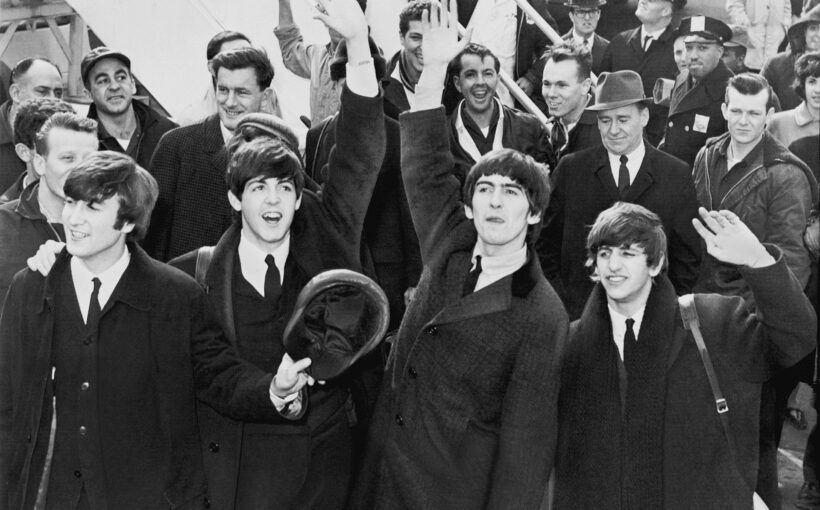A few minutes after I took my seat at an advanced screening of Amazon Prime’s Brian Epstein biopic, Midas Man, I found myself engaged in Beatles chat with the chap next to me. I wasn’t surprised to find a fellow Fab Four fanatic at such an event. But I was surprised when I realised I was speaking with the legendary presenter Paul Gambaccini, a man who, I was soon to discover, met not only John, Paul, George and Ringo, but also original drummer Pete Best and bassist Stuart Sutcliffe’s sister. Or “five and a half Beatles”, as he put it.
As the lights went down and we readied ourselves, Gambaccini whispered that he hoped this wasn’t going to be “another Beatles film with no Beatles music in it”. The subject of soundtracks in Beatles biopics has always been an elephant in the room among fans, and Midas Man, like Backbeat (1994), In His Life: The John Lennon Story (2000), Lennon Naked (2010) and many others before it, did indeed lack any Lennon and McCartney (or Harrison) originals.
But, given that it cost the 2019 film Yesterday US$10 million (£7.7 million) to acquire the rights to use the Beatles’ music (40% of the entire budget), this shouldn’t really come as a surprise. And there aren’t any crafty ways round it, either. This much we know from the fate of 1979’s Birth of The Beatles which has been prevented from reissue due to its unauthorised use of songs.
Midas Man tells the story of the legendary Beatles manager, Brian Epstein. The film follows Epstein, played by Jacob Fortune-Lloyd, from his days as the unfulfilled manager of a furniture and musical instrument shop to making good on his promise that his unknown and unsigned band, The Beatles, would one day be “bigger than Elvis”.
Some reviews have taken issue at how the film shows Epstein one minute suavely cajoling American TV host Ed Sullivan, and the next falling to pieces after the death of his father. But such contradictions of character were exactly what made Epstein who he was – a man Beatles biographer Craig Brown has described as alternatively lonely, businesslike, scrupulous, obsessive, shrewd, awkward and pernickety.
For me, it’s Epstein’s complexity that makes him so endearing, both in real life and in Midas Man. Fortune-Lloyd expertly and realistically portrays him as confident in his abilities, but also on the cusp of being consumed by self-doubt at any moment. He also carries off the magnetic charm that led Epstein on his scarcely believable journey from selling pianos in his family shop to one of the most powerful people in the entertainment industry within the space of a few years.
In what is ultimately a tragic story of a troubled life, it’s unsurprising that there are plenty of tearjerker moments. But screenwriters Brigit Grant and Jonathan Wakeham avoid the temptation to overdo the pathos, choosing subtlety over the sledgehammer.
A combination of this and Fortune-Lloyd’s understated acting lead to several poignant moments in the film. Epstein yearns to be a part of the band’s world, but is kept on the sidelines due to his position of authority, (perceived) difference in class and, most importantly, his own social awkwardness.
Being Brian
The film’s sets are a highlight throughout, from 1960s Liverpool’s unique blend of vibrancy and poverty to the glitz and glamour of New York. The North End Music Store (NEMs) where Epstein worked and which became his management company, thrums with the energy and anticipation of the tectonic shift in culture that’s just around the corner. And I’ve scarcely experienced a more immersive recreation of The Beatles’s lunchtime performances at The Cavern.
Alongside Fortune-Lloyd’s nuanced performance, there were several other standouts. Leo Harvey-Elledge provides much of the humour as George Harrison, Rosie Day has a whale of a time as an effervescent Cilla Black, and the consistently excellent Eddie Marsan and Emily Watson are perfectly cast (although somewhat underused) as Epstein’s parents.
Good as the overall casting is, however, it’s hard to see Fortune-Lloyd’s Epstein as only six years senior to Jonah Lees’s John Lennon. As versatile as the former is, he looks significantly older than Epstein’s 27 years – the age he was when he first saw The Beatles perform at The Cavern in 1961.
This may seem like a minor point, but it affects the dynamic between him and the band, which, combined with the significant height difference between Fortune Lloyd (6ft 2) and Lees (5ft 8) gives a sense of authority that was more representative of The Beatles’ producer, George Martin.
The decision to create a fictionalised love interest in John “Tex” Ellington (Ed Speleers) is also odd. It serves only to suggest that Epstein’s life wasn’t interesting and dramatic enough without fabrication. Which is far from the truth.
Invented characters aside, there’s nothing in Midas Man that die-hard Beatles fans didn’t already know about Epstein. But given that he and The Beatles are part of what’s been called “the greatest story ever told”, that’s not necessarily a bad thing.
Looking for something good? Cut through the noise with a carefully curated selection of the latest releases, live events and exhibitions, straight to your inbox every fortnight, on Fridays. Sign up here.
![]()
Glenn Fosbraey does not work for, consult, own shares in or receive funding from any company or organisation that would benefit from this article, and has disclosed no relevant affiliations beyond their academic appointment.



